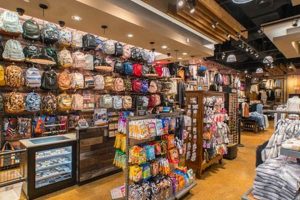An establishment providing skateboarding equipment, apparel, and related services within the state of New Jersey is a resource for both novice and experienced skateboarders. Such a business typically offers a range of products, from skateboards and components like decks, trucks, and wheels, to safety gear such as helmets, pads, and guards. It may also provide repair services and skateboarding advice.
These businesses play a vital role in fostering the skateboarding community. They offer access to quality equipment, crucial for both safety and performance. Furthermore, the knowledgeable staff can guide customers in selecting the right gear for their skill level and intended use. Over time, these locations have become community hubs, often sponsoring events, hosting competitions, and providing a gathering place for skateboarders.
The following sections will delve into various aspects of finding a suitable skateboarding retailer in New Jersey, focusing on factors to consider when making a purchase, the types of products and services commonly offered, and the role these businesses play within the broader community.
Tips for Selecting a Skateboarding Retailer in New Jersey
Selecting a suitable retailer for skateboarding equipment requires careful consideration. The following tips are intended to guide prospective customers in making informed decisions, ensuring they acquire the appropriate products and services for their needs.
Tip 1: Assess Product Variety: A comprehensive retailer offers a diverse range of skateboards, components, and protective gear. This ensures customers can find equipment that matches their skill level and skating style.
Tip 2: Evaluate Staff Expertise: Knowledgeable staff can provide valuable guidance on product selection and maintenance. Prioritize retailers where employees demonstrate a thorough understanding of skateboarding equipment.
Tip 3: Inspect Product Quality: Examine the materials and construction of skateboards and components. Opt for durable, high-quality products that can withstand regular use.
Tip 4: Verify Safety Gear Compliance: Ensure that helmets, pads, and other protective gear meet established safety standards. Compliance certifications indicate that the equipment has been tested and proven to offer adequate protection.
Tip 5: Consider Pricing and Value: Compare prices across different retailers while factoring in product quality and service. The least expensive option may not always offer the best long-term value.
Tip 6: Investigate Return Policies: Understand the retailer’s return policy before making a purchase. A flexible return policy provides recourse if the equipment does not meet expectations.
Tip 7: Check for Community Engagement: Retailers that actively participate in the skateboarding community often demonstrate a commitment to customer satisfaction and product knowledge.
Adhering to these recommendations can significantly enhance the purchasing experience. By prioritizing product variety, staff expertise, product quality, safety compliance, fair pricing, return policies, and community involvement, customers can make informed decisions that contribute to a safer and more enjoyable skateboarding experience.
The subsequent sections will elaborate on specific product categories, maintenance procedures, and the importance of safety in skateboarding.
1. Equipment Selection
The availability and diversity of skateboarding equipment constitute a primary determinant of a retailer’s value and appeal. The breadth of “Equipment Selection” directly influences a customer’s ability to find suitable products that align with their skill level, skating style, and budgetary constraints.
- Skateboard Completes
Pre-assembled skateboards offer a convenient entry point for beginners. Retailers typically stock a range of completes with varying deck sizes, truck brands, and wheel durometers. The availability of different complete configurations allows novice skaters to find a setup tailored to their initial learning experience. The quality and construction of completes directly impact the rider’s ability to learn basic maneuvers and progress.
- Decks
Skateboard decks represent a highly customizable component. Retailers should offer a selection of decks made from different materials, such as maple, carbon fiber, and composites. Deck width, length, and concave influence board feel and responsiveness. A comprehensive retailer provides decks from established brands as well as smaller, independent manufacturers, catering to a wide range of preferences and skating styles.
- Trucks
Skateboard trucks affect turning radius and stability. Retailers should stock trucks from reputable manufacturers, offering various axle widths and kingpin configurations. The selection should include options suitable for street skating, park riding, and longboarding. The quality of the trucks directly impacts the skateboard’s overall performance and durability.
- Wheels
Skateboard wheels influence speed, grip, and ride smoothness. Retailers should carry wheels with varying diameters, durometers (hardness), and contact patches. The selection should include options suitable for different terrains, from smooth concrete to rough asphalt. The quality of the wheels directly impacts the rider’s comfort and control.
The effectiveness of a skateboarding retailer hinges significantly on the curated equipment selection. A retailer capable of providing a diverse array of components, from complete setups to individual parts, enhances the likelihood of customer satisfaction. A customer’s access to varied products enables tailored customization, catering specifically to individual requirements and skating preferences. This ensures that the customer can confidently pursue their passion with gear that meets their performance needs, thereby bolstering the retailer’s reputation and fostering long-term customer relationships.
2. Expert Advice
The availability of expert advice within a skateboarding retail establishment is directly correlated with customer satisfaction and safety. A knowledgeable staff can provide critical guidance on equipment selection, maintenance, and safe skateboarding practices. This is particularly vital for novice skateboarders who may lack the experience to make informed decisions independently. For instance, an employee with extensive skateboarding experience can assess a customer’s skill level and recommend a suitable skateboard deck size, truck configuration, and wheel durometer to optimize their learning curve and minimize the risk of injury. This personalized assistance can dramatically improve the overall skateboarding experience, turning a potentially frustrating process into a positive and encouraging introduction to the sport.
Furthermore, expert advice extends beyond initial product selection. Skateboarding equipment requires regular maintenance to ensure optimal performance and longevity. Staff proficient in skateboard mechanics can demonstrate proper techniques for tightening trucks, cleaning bearings, and replacing worn-out components. This proactive approach to maintenance education empowers customers to maintain their equipment effectively, extending its lifespan and reducing the need for frequent replacements. Real-world scenarios demonstrate the value of this service: a skater experiencing wheel slippage can receive on-the-spot advice about bearing cleaning or replacement, averting a potentially dangerous situation. Such assistance, available at a physical retail location, contrasts sharply with the impersonal nature of online shopping, underscoring the importance of expert guidance within a skateboarding retail environment.
In summary, the provision of expert advice within a skateboarding retailer is not merely an ancillary service; it is an integral component of the business model. It directly impacts customer satisfaction, promotes safe skateboarding practices, and fosters a sense of community. The ability to receive personalized guidance from experienced skateboarders creates a tangible advantage over online retailers and contributes to the sustained relevance and value of physical skateboarding stores. By prioritizing expert advice, a skateboarding retailer not only sells products but also invests in the long-term well-being of its customers and the skateboarding community as a whole.
3. Safety Standards
The adherence to and promotion of safety standards represent a critical component of any reputable skateboarding retail establishment. The direct correlation between safe skateboarding practices and the products offered by a “nj skate shop” dictates a responsibility for these businesses to prioritize safety. Substandard equipment, such as poorly constructed helmets or decks prone to breakage, poses a direct threat to skateboarders. The prevalence of such products can lead to increased injuries and erode public trust in both the retailer and the skateboarding community. Therefore, a commitment to sourcing and selling only products that meet established safety criteria is paramount. An example includes ensuring helmets comply with certifications from organizations such as ASTM International or the Consumer Product Safety Commission (CPSC), indicating they have undergone rigorous testing and meet minimum impact resistance standards. Similarly, decks should be constructed from high-quality materials and undergo stress testing to ensure they can withstand the demands of skateboarding.
The implementation of safety standards extends beyond product selection. A responsible “nj skate shop” also plays a vital role in educating customers about safe skateboarding practices. This can involve providing information on proper helmet fit, the importance of wearing appropriate protective gear, and the risks associated with skating in traffic or on unsafe surfaces. Furthermore, a knowledgeable staff can offer guidance on choosing the right equipment for a skater’s skill level and intended use. For instance, a novice skateboarder might benefit from a wider deck and softer wheels to improve stability and control, while an experienced skater might prefer a narrower deck and harder wheels for enhanced maneuverability. By providing tailored advice and promoting a culture of safety, these retailers contribute to a safer and more enjoyable skateboarding experience for all.
In conclusion, the integration of robust safety standards is not merely a regulatory obligation but a moral imperative for any “nj skate shop”. The selection of certified and durable equipment, coupled with proactive customer education, safeguards the well-being of skateboarders and fosters a sustainable skateboarding community. Challenges remain in effectively communicating safety information and enforcing standards, but prioritizing safety reinforces the legitimacy and value of these establishments. The understanding and application of these safety standards are crucial for promoting skateboarding as a safe and enjoyable activity.
4. Community Role
The function of a “nj skate shop” extends beyond commercial transactions, encompassing a significant role in shaping and sustaining the skateboarding community. This involves providing resources, fostering social connections, and promoting the sport’s culture within the state.
- Sponsorship of Local Events
Active involvement in local skateboarding events, such as competitions, demonstrations, and workshops, elevates community engagement. A “nj skate shop” sponsoring these events provides financial support, equipment, and logistical assistance, fostering participation and showcasing local talent. This sponsorship creates visibility for the shop and solidifies its position as a community anchor.
- Creation of Gathering Spaces
The physical shop itself serves as a gathering point for skateboarders. A well-designed “nj skate shop” incorporates seating areas, video screens displaying skateboarding content, and bulletin boards for community announcements. These spaces facilitate interaction among skateboarders, promoting a sense of belonging and fostering a supportive environment for skill development.
- Mentorship and Education
Experienced staff at a “nj skate shop” provide mentorship to novice skateboarders, offering advice on technique, safety, and equipment maintenance. This mentorship extends beyond simple product recommendations, fostering a deeper understanding of skateboarding culture and promoting responsible skateboarding practices. Workshops and clinics can further enhance this educational role.
- Advocacy for Skateboarding Infrastructure
A “nj skate shop” can advocate for the development and maintenance of skateboarding infrastructure within the community. This includes supporting the construction of skateparks, lobbying local government for skateboarding-friendly policies, and organizing community clean-up efforts to maintain existing skate spots. Such advocacy demonstrates a commitment to the long-term growth and sustainability of skateboarding in the area.
These facets of community involvement highlight the multifaceted role of a “nj skate shop.” By actively engaging in sponsorship, creating gathering spaces, providing mentorship, and advocating for infrastructure, these establishments contribute significantly to the vibrancy and sustainability of the New Jersey skateboarding community. The impact of the shop is felt beyond individual transactions, influencing the culture and resources available to skateboarders throughout the state.
5. Repair Services
The availability and quality of repair services within a “nj skate shop” significantly impact customer satisfaction and the longevity of skateboarding equipment. These services address common issues arising from regular use, extending the lifespan of skateboards and components while minimizing the need for costly replacements.
- Bearing Maintenance and Replacement
Skateboard bearings are prone to contamination from dirt and debris, affecting their rolling efficiency. Repair services typically include cleaning, lubricating, and replacing worn or damaged bearings. Proper bearing maintenance improves speed, reduces friction, and extends the life of the wheels. For example, a skateboarder experiencing slow rolling or noisy wheels might require a bearing cleaning service to restore optimal performance. The “nj skate shop” offering this service is providing a basic, yet crucial, maintenance function.
- Truck Replacement and Adjustment
Skateboard trucks can be damaged from impacts or develop loose components over time. Repair services include replacing bent axles, stripped kingpins, and worn bushings. Proper truck maintenance ensures stable turning and control. If a skateboarder experiences wobbly or unresponsive steering, a truck adjustment or replacement may be necessary. This targeted repair enhances board control and safety.
- Deck Repair and Replacement
Skateboard decks are subject to wear and tear, including cracks, chips, and delamination. While complete deck replacement is often necessary for severe damage, repair services might include patching small cracks or reinforcing weak spots. A fractured or significantly damaged deck needs professional replacement to prevent structural failure during use. The “nj skate shop” provides options for both partial repairs and full replacements.
- Wheel Replacement
Skateboard wheels wear down with use, losing their shape and grip. Repair services involve replacing worn wheels with new ones, selecting the appropriate size and durometer for the rider’s style and terrain. Worn wheels impact speed, control, and the ability to perform tricks effectively. By providing a variety of wheel options, the “nj skate shop” allows skaters to maintain peak performance.
The integration of comprehensive repair services within a “nj skate shop” provides tangible benefits to skateboarders. These services extend the lifespan of equipment, ensure safe operation, and foster a sense of customer loyalty. The presence of skilled technicians and a well-stocked inventory of replacement parts distinguishes a reputable “nj skate shop” from a purely retail-oriented establishment, reinforcing its role as a valuable resource within the skateboarding community.
6. Custom Builds
The provision of custom-built skateboards is a defining characteristic of a comprehensive “nj skate shop”. This service transcends mere retail, offering skateboarders the ability to personalize their equipment to precise specifications. Custom builds address the diverse needs of skaters with varying styles, skill levels, and physical attributes. For example, a skater specializing in vert ramp riding may require a wider deck with specific truck and wheel configurations to enhance stability and control. Conversely, a street skater may prioritize a lighter setup with smaller wheels for increased maneuverability. A “nj skate shop” capable of facilitating custom builds empowers skaters to optimize their equipment for peak performance and personal preference. Failure to offer this service limits the shop’s appeal to a segment of the skateboarding population seeking individualized solutions.
The process of a custom build typically involves a consultation between the skater and a knowledgeable shop employee. This consultation assesses the skater’s riding style, experience level, and desired board characteristics. The employee then guides the skater through the selection of individual components, including the deck, trucks, wheels, bearings, and hardware. The “nj skate shop” may offer a range of brands and price points to accommodate varying budgets. The final assembly of the custom skateboard is often performed by the shop’s technicians, ensuring proper alignment and functionality. This hands-on approach differentiates a “nj skate shop” from online retailers, offering a level of personalized service and expertise unattainable through purely digital channels. Real world advantages include on-site adjustments and immediate feedback.
The offering of custom builds reflects the “nj skate shop’s” commitment to the skateboarding community. It acknowledges the individuality of skaters and provides a platform for self-expression through equipment customization. While challenges exist in managing inventory and accommodating diverse customer requests, the benefits of offering custom builds far outweigh the logistical complexities. Custom builds enhance customer loyalty, attract experienced skaters, and solidify the “nj skate shop’s” position as a hub for skateboarding culture. This service is essential for sustaining a vibrant and engaged skateboarding community within New Jersey.
7. Brand Variety
The availability of a diverse selection of brands within a skateboarding retailer is a critical factor influencing customer acquisition, satisfaction, and the overall health of the skateboarding ecosystem. The range of brands offered directly reflects the retailer’s commitment to catering to the multifaceted preferences of skateboarders.
- Catering to Diverse Skating Styles
Different brands specialize in equipment tailored to specific skateboarding disciplines. For example, a brand might focus on street skating with lightweight decks and responsive trucks, while another might prioritize downhill longboarding with stable decks and specialized wheels. A “nj skate shop” offering a broad spectrum of brands ensures that customers can find equipment suited to their intended use, enhancing performance and enjoyment. Limiting brand variety restricts the shop’s ability to serve the full range of skateboarding styles prevalent in the community.
- Accommodating Varying Skill Levels
Certain brands cater specifically to beginner skateboarders, offering durable and affordable equipment designed to facilitate the learning process. Other brands target experienced skaters, providing high-performance components with advanced features. A “nj skate shop” with a comprehensive brand selection accommodates customers at all skill levels, fostering inclusivity and encouraging progression within the sport. The lack of options can alienate novice skaters or fail to meet the demands of seasoned riders.
- Supporting Independent and Established Brands
The skateboarding industry comprises both established, mainstream brands and smaller, independent companies. A “nj skate shop” that supports both types of brands contributes to a healthy and diverse market. Supporting independent brands provides opportunities for innovation and creativity within the skateboarding community, while stocking established brands offers customers familiarity and reliability. A balanced approach to brand selection demonstrates the retailer’s commitment to the long-term sustainability of the skateboarding industry.
- Addressing Budgetary Considerations
Brand variety allows a “nj skate shop” to offer equipment at various price points, accommodating customers with differing budgetary constraints. Some brands specialize in affordable, entry-level equipment, while others focus on high-end, premium components. A diverse brand selection ensures that skateboarding is accessible to individuals regardless of their financial situation, promoting inclusivity and widening the reach of the sport.
The strategic curation of brand variety within a “nj skate shop” is essential for establishing a thriving skateboarding destination. By catering to diverse skating styles, accommodating varying skill levels, supporting both independent and established brands, and addressing budgetary considerations, the “nj skate shop” enhances its appeal, fosters customer loyalty, and contributes to the overall growth and health of the skateboarding community within New Jersey.
Frequently Asked Questions about Skateboarding Retailers in New Jersey
This section addresses common inquiries and misconceptions regarding skateboarding retailers operating within the state of New Jersey, providing clarification and valuable insights.
Question 1: What constitutes a reputable skateboarding retailer?
A reputable retailer prioritizes product quality, knowledgeable staff, and community engagement. It offers a diverse range of equipment from established and reputable brands. The staff should be proficient in providing guidance on product selection and maintenance. Active involvement in the local skateboarding community is also indicative of a reputable retailer.
Question 2: How can the authenticity of skateboarding equipment be verified?
Authenticity can be verified by purchasing from authorized retailers, examining product packaging for official branding and trademarks, and comparing prices against industry standards. Beware of significantly discounted products from unverified sources, as these may be counterfeit.
Question 3: What safety precautions should be taken when purchasing skateboarding equipment?
Prioritize safety by ensuring that helmets and protective gear meet established safety standards. Check for certifications from organizations like ASTM International or the CPSC. Select equipment appropriate for the skater’s skill level and intended use. Consult with knowledgeable staff for guidance on proper equipment selection and fit.
Question 4: What recourse is available if purchased skateboarding equipment is defective?
Contact the retailer directly to inquire about their return or exchange policy. Retain the original receipt and packaging. If the retailer is uncooperative, contact the manufacturer of the equipment to explore warranty options. Document all communication and keep records of any expenses incurred.
Question 5: How does the selection of equipment affect the skateboarding experience?
The correct equipment selection significantly impacts performance, safety, and enjoyment. Appropriate deck size, truck configuration, and wheel durometer enhance control and stability. Ill-fitting or substandard equipment can hinder progress and increase the risk of injury. Seek guidance from experienced skateboarders or knowledgeable retail staff to optimize equipment choices.
Question 6: What role do skateboarding retailers play in the local skateboarding community?
Retailers often serve as community hubs, sponsoring local events, providing gathering spaces for skateboarders, and offering mentorship to novice riders. They advocate for skateboarding infrastructure and promote responsible skateboarding practices. Their presence contributes to the vibrancy and sustainability of the skateboarding community.
These frequently asked questions provide a foundation for understanding the critical aspects of skateboarding retailers in New Jersey and ensure informed decision-making.
The following section will explore advanced concepts related to skateboarding equipment and techniques.
Conclusion
This article has explored the multifaceted dimensions of skateboarding retailers operating within New Jersey. It has emphasized the critical importance of product quality, expert advice, adherence to safety standards, community engagement, repair services, custom builds, and brand variety. Each of these elements contributes to the overall value and relevance of a “nj skate shop” in serving the needs of the skateboarding community.
The continued success and sustainability of skateboarding within New Jersey relies on the commitment of retailers to uphold these standards. By prioritizing quality, expertise, safety, and community, these establishments can foster a thriving environment for skateboarders of all skill levels, ensuring the sport’s continued growth and positive impact on the state. Continued vigilance and dedication to these principles are crucial for shaping the future of skateboarding in New Jersey.







